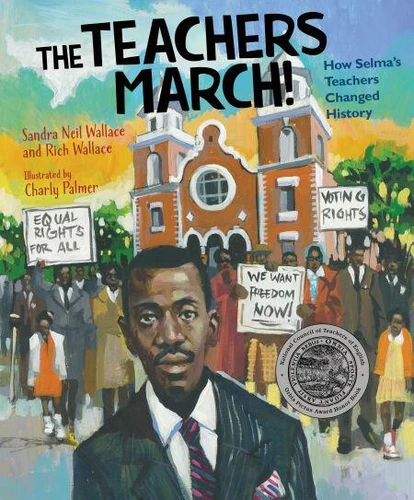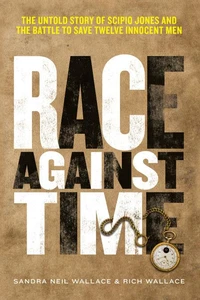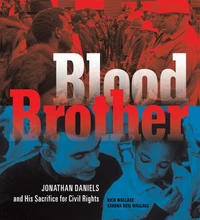The Teachers March!. How Selma's Teachers Changed History
Par : , ,Formats :
Disponible dans votre compte client Decitre ou Furet du Nord dès validation de votre commande. Le format Epub fixed layout protégé est :
- Compatible avec une lecture sur My Vivlio (smartphone, tablette, ordinateur)
- Compatible avec une lecture sur liseuses Vivlio
- Pour les liseuses autres que Vivlio, vous devez utiliser le logiciel Adobe Digital Edition. Non compatible avec la lecture sur les liseuses Kindle, Remarkable et Sony
- Non compatible avec un achat hors France métropolitaine
 , qui est-ce ?
, qui est-ce ?Notre partenaire de plateforme de lecture numérique où vous retrouverez l'ensemble de vos ebooks gratuitement
Pour en savoir plus sur nos ebooks, consultez notre aide en ligne ici
- Nombre de pages48
- FormatEpub fixed layout
- ISBN978-1-63592-453-4
- EAN9781635924534
- Date de parution29/09/2020
- Protection num.Adobe DRM
- Taille32 Mo
- Infos supplémentairesepub
- ÉditeurCalkins Creek
Résumé
FOUR STARRED REVIEWS!NCTE Orbis Pictus Honor Book ° Booklist Editors' Choice ° Jane Addams Children's Book Award, Finalist ° A Notable Book for a Global Society? "An alarmingly relevant book that mirrors current events." -Kirkus Reviews, starred reviewDemonstrating the power of protest and standing up for a just cause, here is an exciting tribute to the educators who participated in the 1965 Selma Teachers' March.
Reverend F. D. Reese was a leader of the Voting Rights Movement in Selma, Alabama. As a teacher and principal, he recognized that his colleagues were viewed with great respect in the city. Could he convince them to risk their jobs--and perhaps their lives--by organizing a teachers-only march to the county courthouse to demand their right to vote? On January 22, 1965, the Black teachers left their classrooms and did just that, with Reverend Reese leading the way.
Noted nonfiction authors Sandra Neil Wallace and Rich Wallace conducted the last interviews with Reverend Reese before his death in 2018 and interviewed several teachers and their family members in order to tell this story, which is especially important today.
Reverend F. D. Reese was a leader of the Voting Rights Movement in Selma, Alabama. As a teacher and principal, he recognized that his colleagues were viewed with great respect in the city. Could he convince them to risk their jobs--and perhaps their lives--by organizing a teachers-only march to the county courthouse to demand their right to vote? On January 22, 1965, the Black teachers left their classrooms and did just that, with Reverend Reese leading the way.
Noted nonfiction authors Sandra Neil Wallace and Rich Wallace conducted the last interviews with Reverend Reese before his death in 2018 and interviewed several teachers and their family members in order to tell this story, which is especially important today.
FOUR STARRED REVIEWS!NCTE Orbis Pictus Honor Book ° Booklist Editors' Choice ° Jane Addams Children's Book Award, Finalist ° A Notable Book for a Global Society? "An alarmingly relevant book that mirrors current events." -Kirkus Reviews, starred reviewDemonstrating the power of protest and standing up for a just cause, here is an exciting tribute to the educators who participated in the 1965 Selma Teachers' March.
Reverend F. D. Reese was a leader of the Voting Rights Movement in Selma, Alabama. As a teacher and principal, he recognized that his colleagues were viewed with great respect in the city. Could he convince them to risk their jobs--and perhaps their lives--by organizing a teachers-only march to the county courthouse to demand their right to vote? On January 22, 1965, the Black teachers left their classrooms and did just that, with Reverend Reese leading the way.
Noted nonfiction authors Sandra Neil Wallace and Rich Wallace conducted the last interviews with Reverend Reese before his death in 2018 and interviewed several teachers and their family members in order to tell this story, which is especially important today.
Reverend F. D. Reese was a leader of the Voting Rights Movement in Selma, Alabama. As a teacher and principal, he recognized that his colleagues were viewed with great respect in the city. Could he convince them to risk their jobs--and perhaps their lives--by organizing a teachers-only march to the county courthouse to demand their right to vote? On January 22, 1965, the Black teachers left their classrooms and did just that, with Reverend Reese leading the way.
Noted nonfiction authors Sandra Neil Wallace and Rich Wallace conducted the last interviews with Reverend Reese before his death in 2018 and interviewed several teachers and their family members in order to tell this story, which is especially important today.






